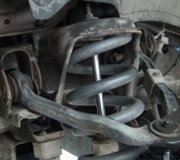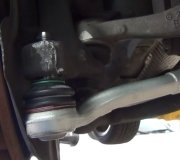Automatic transmissions generally do not have clutches, but some have electric solenoid packs that direct the fluid through particular internal paths, to accomplish shifting. Virtually all automatic trnasmissions use a torque convertor that allows the engine to idle without stalling, while the vehicle is stopped and the transmission is "in gear." If anything in the drive path was actually slipping, such as the transmission or the torque convertor, the engine would race (if working correctly) whenever the slipping happened, especially when climbing up a hill. If you have a "tach" (tachometer that shows engine RPM), you would see the increase in engine speed indicated by the tach. You would also hear the engine racing if your hearing is normal. But you didn't mention anything about engine speed or noises. So, either the engine is very low on power, or there is an abnormal load on it. You could have a brake dragging somewhere, such as a parking brake. You could have a bad wheel bearing, on any combination of the four wheels. You could also have a transmission or differential problem. I suggest you jack up all four wheels, ONE at a time, MAKING SURE that the vehicle is in neutral or park, and not in a drive gear, and the vehicle is on a level surface. Chock wheels that are ON the ground to prevent possible rolling off the jack, in either direction! With the engine OFF, and, with the transmission in neutral or park, try to rotate each wheel by hand, while off the ground (pavement, drive, or whatever). If you can rotate each wheel easily, then start the engine and repeat the test. Are the wheels free to rotate with the engine idling? If not, you could have a power brake problem, applying brakes without you touching the brake pedal. If there is no problem rotating off-the-ground wheels with the engine running, then your problem is very likely low output power from the engine. With logical tests, it is possible to identify the problem with your vehicle! But some problems are harder to identify than others, and those take more effort. Let me know the results of the tests. I may be unavailable on this forum until Monday, May 15th.
Thursday, May 12th, 2011 AT 2:20 PM



